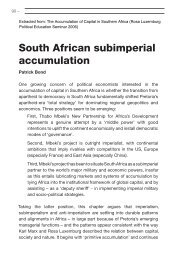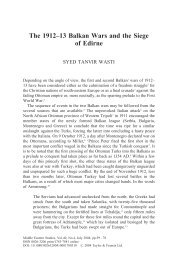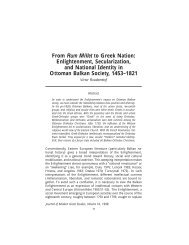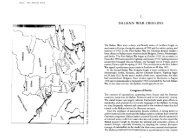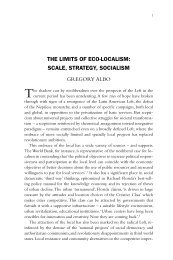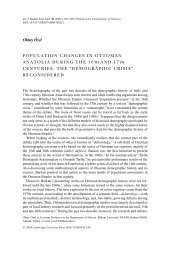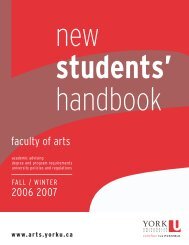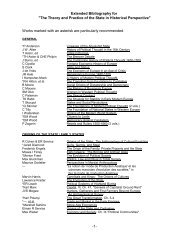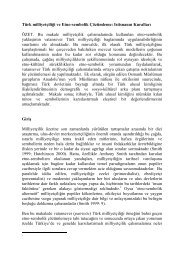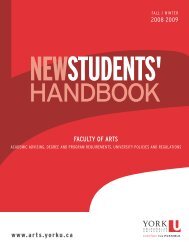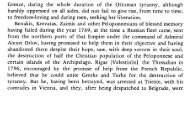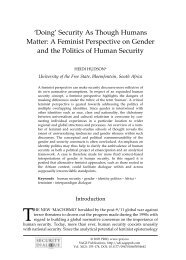FYCSG 05/06 REV2 - Faculty of Arts - York University
FYCSG 05/06 REV2 - Faculty of Arts - York University
FYCSG 05/06 REV2 - Faculty of Arts - York University
Create successful ePaper yourself
Turn your PDF publications into a flip-book with our unique Google optimized e-Paper software.
medieval and early modern Europe 2, modern Europe 3, Great Britain 4, Canada 5, United<br />
States 6, Africa, Asia, Latin America and Caribbean 7, comparative and interdisciplinary 8),<br />
and the third and fourth digits the number <strong>of</strong> the course within the field.<br />
1. 1000-LEVEL COURSES<br />
AS/HIST1010 6.0 War, Revolution and Society. A study <strong>of</strong> the major political and<br />
social upheavals which have helped to shape the contemporary world. The course<br />
will concentrate on the origins <strong>of</strong> the two World Wars and the “Cold War”, and on<br />
their consequences. Topics for study also include the end <strong>of</strong> the European empires<br />
after 1945, Third World revolutions, and current conflicts in the Middle East, Africa, and<br />
Latin America.<br />
AS/HIST1030 6.0 Imperialism and Nationalism in Modern Asia. This course concerns<br />
the community <strong>of</strong> independent Asian nations, examining their distinctive traditional<br />
societies, the impact <strong>of</strong> imperialism, their reactions to it and their modern evolution.<br />
AS/HIST1<strong>05</strong>0 6.0 Life, Love and Labour. This course explores the ways in which large<br />
historical forces in the recent past, such as industrialization, urbanization and the<br />
growth <strong>of</strong> the state, have affected family, community, work and leisure and ways in<br />
which people have responded by embracing, adapting to, or resisting change.<br />
AS/HIST1080 6.0 Growing Up in North America. This course examines what it meant<br />
to be young in different times and places in the United States and Canada, and explores<br />
the interplay <strong>of</strong> cultural and material circumstances that shaped ideas about childhood<br />
and children’s actual lives.<br />
2. 2000-LEVEL COURSES<br />
AS/HIST2100 6.0 Ancient Greece and Rome. The course <strong>of</strong>fers a general introduction<br />
to the history <strong>of</strong> ancient Greece and Rome. It surveys the ancient world from the<br />
Greek Bronze Age in the second millennium B.C. until the fall <strong>of</strong> the Roman Empire in<br />
the fifth century A.D. Specific periods are studied with emphasis on the social,<br />
economic, political, and intellectual history <strong>of</strong> each. Attention is devoted to the evaluation<br />
<strong>of</strong> relevant literary, archaeological, and documentary evidence.<br />
AS/HIST2110 6.0 The Ancient Near East. This course surveys the history <strong>of</strong> some <strong>of</strong> the<br />
oldest civilizations <strong>of</strong> the world and their immediate successors; Sumer, Akkad, Assyria,<br />
Babylonia, Egypt, “Hittite-land”, Canaan, and Israel. Problems <strong>of</strong> how to determine the<br />
facts <strong>of</strong> ancient history are also discussed.<br />
AS/HIST2220 6.0 Medieval and Early Modern Europe. This course surveys the<br />
economic, political, social and cultural evolution <strong>of</strong> Europe from the fall <strong>of</strong> the Roman<br />
Empire to the 17th century.<br />
Degree credit exclusions: AS/HIST2200 6.0, AS/HIST2210 6.0, GL/HIST2625 6.0,<br />
GL/HIST3225 3.0, AK/HIST2510 6.0.<br />
AS/HIST2300 6.0 Modern Europe. An introduction to the development <strong>of</strong> modern<br />
Europe from the sixteenth century to the present day. The course explores many aspects<br />
<strong>of</strong> European society, politics and intellectual life during the past three centuries, including<br />
the French Revolution, the Russian revolution and the European Union since 1945.<br />
AS/HIST2310 6.0 Russian Culture: Continuity and Conflict. This course examines<br />
Russian culture in an historical and social context focusing on Kievan Rus’, the rise <strong>of</strong><br />
Muscovy, the expansion <strong>of</strong> the Russian Empire and its revolutionary mutation into<br />
the Soviet Union, and the post-Soviet contemporary scene. (Cross-listed to<br />
AS/HUMA2750 6.0, AS/RU2750 6.0.)<br />
Prerequisite: No knowledge <strong>of</strong> Russian required.<br />
Degree credit exclusion: AS/HUMA2990D 6.0.<br />
AS/HIST2400 6.0 British History. An examination <strong>of</strong> the evolution <strong>of</strong> Britain through the<br />
analysis <strong>of</strong> a series <strong>of</strong> major problems in political, social, economic, and intellectual<br />
history. The topics chosen will touch upon the main features <strong>of</strong> British development.<br />
AS/HIST2500 6.0 Canadian History. An introduction to the development <strong>of</strong> Canada<br />
from pre-European native societies to the present, including the evolution <strong>of</strong> the<br />
economy, social structures and social movements, family and gender relations, cultural<br />
development and conflicts, federal and provincial politics, and external relations.<br />
AS/HIST2600 6.0 United States History. This broad survey <strong>of</strong> United States history<br />
from the colonial period to the Clinton era explores patterns <strong>of</strong> political, economic, social<br />
and cultural change. Specific topics include Native Americans; slavery; the American<br />
Revolution; the Civil War; social reform; the Cold War; and recent economic problems.<br />
AS/HIST2710 6.0 East Asia: Tradition and Defiance. This course explores how distinctive<br />
patterns <strong>of</strong> government, society, and culture emerged over four millennia in East<br />
Asia – primarily China and Japan – and how this endogenous development prepared<br />
those nations to confront and challenge Western supremacy in the modern world.<br />
AS/HIST2720 6.0 Modern Latin America, 1810 to the Present. An introduction to<br />
the history <strong>of</strong> post-colonial Latin America from the early nineteenth century to the<br />
present, with attention to economic, social, political, and ideological developments.<br />
AS/HIST2730 6.0 History <strong>of</strong> the Caribbean. This course examines the historical<br />
development <strong>of</strong> the Caribbean from its aboriginal occupation to twentieth century<br />
socio-political developments. It explores similarities and differences in social and<br />
political structures and cultural characteristics <strong>of</strong> various parts <strong>of</strong> the region.<br />
AS/HIST2750 6.0 African History, 1800 to the Present. The history <strong>of</strong> the African<br />
continent from 1800 to the present, concentrating on such major themes as political<br />
and economic change in pre-colonial African states, the impact <strong>of</strong> colonial rule, and the<br />
emergence <strong>of</strong> modern nationalism.<br />
AS/HIST2790 6.0 Islamic Civilization, 622 – 1400. This course explores the development<br />
and nature <strong>of</strong> Islamic civilization from the seventh century to 1400 AD.<br />
SUGGESTED COURSE SELECTION FOR FIRST YEAR.<br />
(ASSUMES A COURSE LOAD OF 30 CREDITS):<br />
• 1000-level 9 credit Foundations HUMA or SOSC course;<br />
• 1000-level 6 credit HIST course;<br />
• 6 credit elective course or 6 credit 2000-level HIST course;<br />
• 1000-level 6 credit NATS course;<br />
• 3 credit elective course (optional).<br />
Humanities<br />
Traditionally, the humanities include such fields as literature, philosophy, history, art,<br />
architecture, music and religion, and it is characteristic <strong>of</strong> courses <strong>of</strong>fered in the Division <strong>of</strong><br />
Humanities that they embrace more than one <strong>of</strong> these fields or disciplines. In short, the Division<br />
<strong>of</strong> Humanities provides a space for interdisciplinary studies in the area <strong>of</strong> humanities.<br />
Further, it is characteristic <strong>of</strong> courses in the Division <strong>of</strong> Humanities that they pay special<br />
attention to what is unique, particular, and unpredictable in human experience. They are<br />
concerned with all aspects <strong>of</strong> human creativity and thus with cultural expressions <strong>of</strong> a<br />
wide range. Finally, while questions <strong>of</strong> “value” are deliberately (and appropriately) set<br />
aside in most scientific investigations, questions <strong>of</strong> “value” – aesthetic, moral, religious<br />
or social – are focal in a Humanities course. In other words, it is part <strong>of</strong> the concern <strong>of</strong><br />
courses in the humanities to identify the values implicit in a particular society, a piece<br />
<strong>of</strong> literature, a social theory or a work <strong>of</strong> art.<br />
Selected 1000-level courses <strong>of</strong>fered through the Division <strong>of</strong> Humanities are a part <strong>of</strong> the<br />
<strong>Faculty</strong> <strong>of</strong> <strong>Arts</strong> Foundations program. These courses have a 9 credit value and are affiliated<br />
with one <strong>of</strong> the <strong>Arts</strong> Colleges. As a part <strong>of</strong> the General Education requirement <strong>of</strong> the<br />
<strong>Faculty</strong> <strong>of</strong> <strong>Arts</strong>, these courses introduce students to interdisciplinary study and emphasize<br />
critical thinking, reading, and writing skills at the university level.<br />
STUDIES OF CULTURES<br />
WESTERN CULTURE<br />
AS/HUMA1100 9.0 Worlds <strong>of</strong> Ancient Greece and Rome. A study <strong>of</strong> the classical<br />
world with a view to understanding the origin and evolution <strong>of</strong> some <strong>of</strong> the literary,<br />
philosophical, and political ideals <strong>of</strong> ancient Greece and Rome. Materials for this study<br />
are drawn from Greek and Roman literature in translation, with illustrations from<br />
plastic arts. (This course is affiliated with Vanier College.)<br />
AS/HUMA11<strong>05</strong> 9.0 Myth and Imagination in Greece and Rome. The course deals<br />
with ancient and modern definitions <strong>of</strong> mythology. Discussion examines ancient and<br />
modern theories about the origin and nature <strong>of</strong> myths, stories <strong>of</strong> gods and heroes in<br />
literature, films and art, and nationalistic and propagandistic uses <strong>of</strong> myths. (This<br />
course is affiliated with Stong College.)<br />
AS/HUMA1110 9.0 Greek and Biblical Traditions. The stories, symbols, and myths<br />
<strong>of</strong> Greek and Biblical literature have provided the basic images for Western society’s<br />
interpretation <strong>of</strong> itself and its experience. An examination <strong>of</strong> Greek and Biblical traditions<br />
which inform personal and community life today. (This course is affiliated with<br />
Vanier College.)<br />
12




